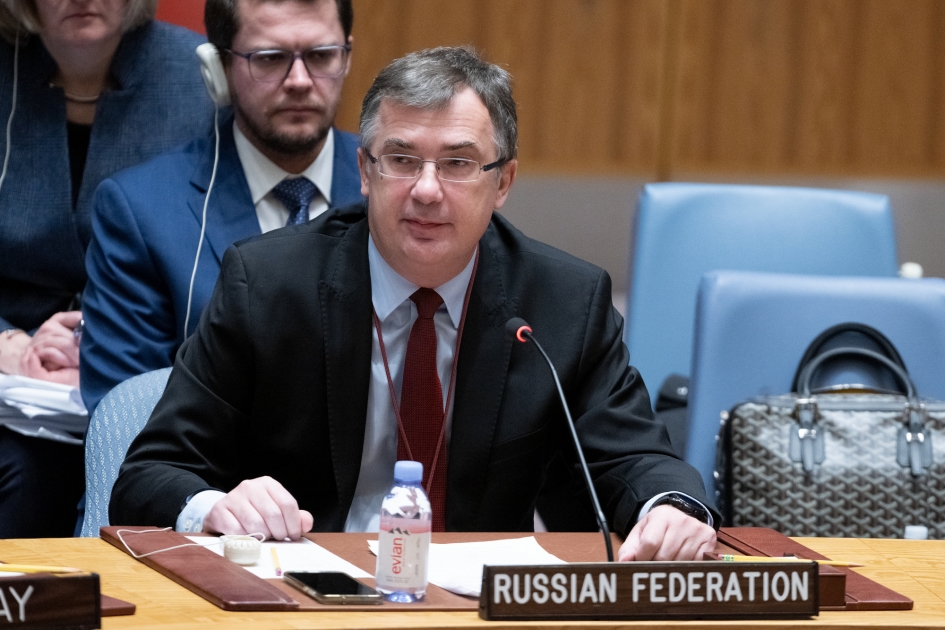Statement by Deputy Permanent Representative Gennady Kuzmin at UNSC briefing on the activity of the International Residual Mechanism for Criminal Tribunals
Mr.President,
We welcome President of the International Residual Mechanism for Criminal Tribunals, as well as the Chief Prosecutor of the IRMCT.
The Mechanism was established by the Security Council 12 years ago. Now finally a “miracle” has happened. The President announced that they intend to transform the IRMCT from a judiciary into a truly residual structure. Thank you, Judge Gatti. Your move confirms that we have been right all these years, when we kept saying that what was called the Residual Mechanism was in fact a judiciary body. We underscored that Security Council’s decisions as to drawdown of the tribunals were not observed, that the Residual Mechanism was deliberately dragging out the cases and assuming uncharacteristic functions in an attempt to prolong its existence. We hope that under a new leadership, the situation is going to change.
In this context, we have taken note of the plans to shut down the detention facility in Arusha and the Sarajevo office starting from 1 April 2023. We think this is going to be a step in the right direction.
In general, taking into account the residual nature of the Mechanism, we think its leadership needs to revise its functions, branches, and offices regularly to check if there is no excessiveness or loss of relevance. Practical recommendations of the UN Office of Internal Oversight Services would be very welcome.
We believe that at our next briefing we will need to hear considerations as to how the residual functions of the IRMCT should be dealt with after the termination of the Mechanism, e.g. how they are going to be transferred to national bodies, the UN Secretariat, etc. In this context. the IRMCT should be guided by the best practices of other similar structures, in particular the Special Tribunal for Lebanon.
The Tribunal for Lebanon has among its responsibilities a task to manage the archives, including material evidence, provide assistance to national bodies, protect the victims and witnesses. Unlike the IRMCT, the Tribunal for Lebanon was able to name the date (31 December 2023), when its activities must be finalized, and has worked out a schedule in order to complete all its outstanding tasks by this date. This case clearly demonstrates that given proper governance and planning, there is nothing extraordinary in terminating the residual functions.
Mr.President,
We once again express our extreme concern over the serious health condition of Ratko Mladic. Being in custody of the IRMCT, Mr.Mladic is in the Mechanism’s area of responsibility. We remind that assessments, care, and improvement of physical and mental health of convicted individuals is a responsibility of the corresponding penitentiary facility and is one of the Standard Minimum Rules for the Treatment of Prisoners. Besides, providing timely and high quality medical care to the persons detained on the authority of the Mechanism is envisaged in basic international legal documents and UNSC specialized resolution 2529 (2020).
We have taken note of the fact that the instrument of early release is only used when the Mechanism needs to absolve itself of being responsible for another convicted person in a severe health condition. The release of R.Brdjanin days before his death, which fact is mentioned in the IRMCT report, points exactly at this trend. We believe this is an outrageous and inhuman practice which must be reconsidered.
The case of R.Mladic provides a good opportunity for the IRMCT to demonstrate a humane approach. It is an open secret that when Mr.Mladic was being sentenced, his fundamental rights as a defendant were gravely violated. There was no objectivity, which fact was eloquently evidenced by the discharge of three judges of the Mechanism precisely because of their biased attitude.
In this regard, with R.Mladic’s health status and advanced age in mind, we believe it would be just if the IRMCT considered his release for humanitarian reasons. This would help recover from the wounds inflicted by the civil war in the Balkans and NATO’s indiscriminate bombardment of former Yugoslavia in 1990s.
Mr.President,
We would like to make a separate point about the IRMCT’s exercise of oversight functions with regard to R.Karadzic’s sentence. Representatives of the Serbian civil society sent an open letter in defense of his rights. The letter gives a detailed account of egregious neglect by the British side, where R.Karadzic is serving his sentence, of his legitimate rights.
In particular, it follows from the document that his rights to a safe environment and access to information are not observed. Apart from other things, he is completely deprived of opportunities to communicate to his close ones and has no access to the materials in his case.
This is a blatant violation of fundamental international legal instruments in the area of protection of human rights, in particular the International Covenant on Civil and Political Rights, and the UN Standard Minimum Rules for the Treatment of Prisoners (so-called Nelson Mandela rules). We call on the IRMCT to approach its oversight functions in a responsible rather than formalistic manner.
Thank you.
